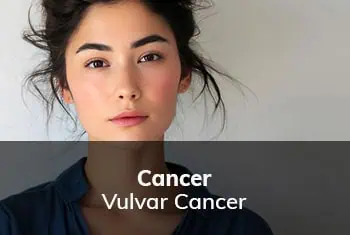The vulva is part of a woman’s external genital area that forms the opening to the urethra and vagina. It includes the vestibule (vaginal opening), the skin folds protecting the vestibule (known as the labia majora and labia minora), and the clitoris.
Cancers of the vulva typically develop on the inner sides of the outer lips (labia majora) and/or the labia minora. Less commonly, cancers can also develop on the clitoris or in the Bartholin glands – the glands just inside the vaginal opening that produce lubrication during sex.
Vulvar cancer is quite rare, comprising only about 0.6% of cancers in women in the U.S.

What are the types of vulvar cancer?
Cancer is a complex disease that can manifest in several different ways. While there are many types of vulvar cancer, squamous cell carcinoma tends to account for most of them. Squamous cells are the body’s primary type of skin cells, and squamous cell carcinomas are cancers that begin in these cells.
When these abnormal cells begin to mutate and multiply, cancer occurs. There are various subtypes, with the most common type of squamous cell vulvar cancer being keratinizing. It generally develops in women aged 55 to 80, and unlike some genital cancers, keratinizing carcinomas are not associated with HPV.
Other types of vulvar cancer include:
- Melanoma. Melanin gives the skin its color, and vulvar melanoma is a cancer of the cells that produce the pigment melanin. As such, a pigmented lesion in the genital area is often the first sign of vulvar melanoma.
- Basal cell carcinoma. Basal cell carcinoma is typically due to sun exposure, making it a rare but not impossible form of vulvar cancer.
- Adenocarcinoma. Adenocarcinoma, or Bartholin gland carcinoma, begins in the Bartholin glands or sweat glands in the vulva and is considered rare.
- Sarcoma. Though sarcoma starts in the bone, muscle, or other soft tissues, it’s an aggressive cancer that is often quick to metastasize.
- Paget’s disease of the vulva. A cancer of the surface skin cells that often only occurs after menopause.
Unfortunately, due to their rarity, these cancers can sometimes be in advanced stages by the time they’re diagnosed.
What are the risk factors for vulvar cancer?
The precise cause of cancer is very difficult to pinpoint. However, medical research has uncovered a few risk factors for developing vulvar cancer. Some of these include:
HPV
HPV, or the human papillomavirus, is a sexually transmitted infection that can sometimes lead to cancerous changes in the genitals. There are various types of HPV, such as the type that causes genital warts. However, it is the high-risk types that can cause cancer. More than half of all cases of vulvar cancer can be linked to an infection of HPV. The virus is spread through skin-to-skin contact with an infected person, and it is particularly easy to transmit because so many people are unaware they are infected. Vulvar cancers associated with HPV are more common in younger women precisely because the virus is so commonly transmitted and undetected.
Age
The risk of vulvar cancer increases with age. More than 80% of vulvar cancers occur in women over the age of 50, and more than 50% occur in women over 70.
HIV
The human immunodeficiency virus, or HIV, damages the immune system and makes it harder for the body to fight off an infection of HPV. Subsequently, it allows cancerous cells to grow and spread unchecked.
Smoking
Cigarettes expose smokers to dozens of harmful, carcinogenic chemicals, which can be absorbed through the lungs and spread to other bodily tissues. Moreover, smoking weakens the immune system, which hurts the body’s ability to fight cancer-causing HPV.
VIN
VIN, or vulvar intraepithelial neoplasia, refers to precancerous cell changes on the vulvar skin. Not all cases of VIN develop into cancer. However, if left untreated, some VIN cases can become cancerous.
History of other cancers
Women with a history of cervical cancer are also at an increased risk for vulvar cancer. This is because these cancers share similar risk factors, including an HPV infection. Atypical moles and melanomas can also increase your chance of developing vulvar cancer.
What are the symptoms of vulvar cancer?
Some cancers have very few symptoms. Precancerous conditions, such as VIN (vulvar intraepithelial neoplasia), usually don’t present with any outward signs. Nevertheless, they can become malignant over time.
Invasive vulvar cancer symptoms can include:
- Vulvar tumor symptoms, such as a bump, wart-like, rough, or raised area of the vulvar skin, which may be white, pink, or red
- A lump under the skin in the vaginal opening
- Thickening or thinning of the vulvar skin
- A discoloration or irregular texture on the vulva
- Vulvar burning and itching, or pain
- Open sores, especially if they last longer than 30 days
- Abnormal bleeding
- Vaginal discharge
If you are experiencing any of the symptoms listed here, you should make an appointment with our gynecologist.
Diagnosing and treating vulvar cancers
If you have concerns about vulvar cancer, our doctor will likely want to perform a few diagnostic tests, including:
- Physical exam. Checking for vulvar cancer bumps, lumps, discoloration, or skin changes through sight and touch.
- Biopsy. A small tissue sample is taken to check for cancerous cells under a microscope.
- Cystoscopy. Viewing the inside of the bladder through a narrow, lighted tube inserted through the urethra.
- Proctoscopy. Viewing the inside of the rectum through a tube inserted through the anus.
- Colposcopy. Viewing the cervix, walls of the vagina, and vulva with a magnifying tool inserted through the vaginal opening.
- MRI. Magnetic resonance imaging is used to create detailed images of the inside of the body.
If your gynecologist suspects vulvar cancer, you may be referred to a specialist in gynecologic oncology to determine your particular diagnosis and the best course of vulvar cancer treatment.
Unfortunately, the more invasive the treatment is, the more likely it is to affect your quality of life. Treatments can include surgical excision to remove the cancer cells and radiation therapy. In some cases, treatment can produce adverse side effects such as reduced physical function, sexual function, and reduced body image. Your oncologist can guide you in which treatment is best for your cancer type and stage.
Have questions about your health? Talk to Dr. Aliabadi
If you have concerns about your reproductive health, including vulvar cancer, reach out to our office. Dr. Aliabadi and her compassionate team are experts in women’s health care. When treated by Dr. Aliabadi, you’re guaranteed to feel safe, heard, and well cared for.
We invite you to establish care with Dr. Aliabadi. Please make an appointment online or call us at (844) 863-6700.
The practice of Dr. Thais Aliabadi and the Outpatient Hysterectomy Center is conveniently located for patients throughout Southern California and the Los Angeles area. We are near Beverly Hills, West Hollywood, Santa Monica, West Los Angeles, Culver City, Hollywood, Venice, Marina del Rey, Malibu, Manhattan Beach, and Downtown Los Angeles.
In some cases, vulvar cancer can resemble other skin conditions, such as genital warts or vulvar Lichen sclerosus. Therefore, if you notice any lump, bump, mole, lesion, or open sore, or cyst in the vulvar area or genital area, you should follow up with your health professional.
Vulvar cancer is considered rare. It accounts for less than 1% of all cancers diagnosed in women.
Many types of vulvar cancer do not grow quickly; instead, they spread over several years. The earlier the cancer of the vulva is detected, the better the survival rates and the less invasive the treatment options.
The HPV vaccine protects against many types of HPV infections, including the high-risk types that cause vulvar, vaginal, and cervical cancers.
Sources
Biological relevance of human papillomaviruses in vulvar cancer – Modern Pathology
https://doi.org/10.1038%2Fmodpathol.2016.197
Vulvar Cancer Treatment – NCI
https://www.cancer.gov/types/vulvar/patient/vulvar-treatment-pdq
















